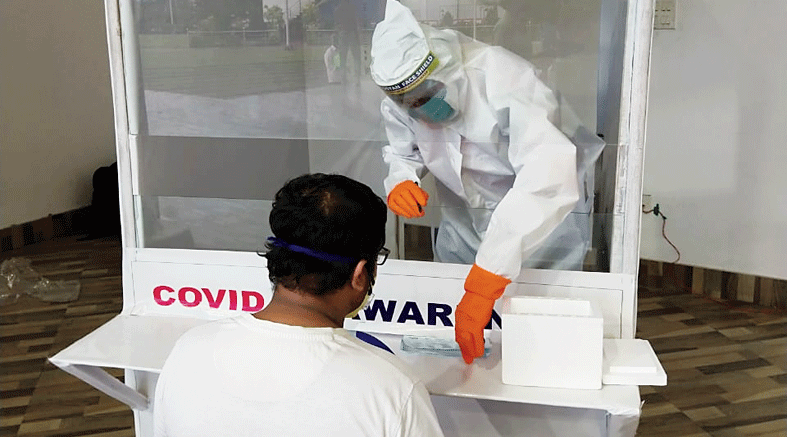Two healthcare workers in India have become reinfected by the new coronavirus although remaining symptom-free during both episodes, scientists have reported while describing what could be the world’s first asymptomatic reinfections.
The scientists say their findings do not change current thinking that reinfections occur only rarely but suggest that asymptomatic reinfections among people at high risk of exposure could go unnoticed just as would asymptomatic first-time infections.
The researchers at the Institute of Genomics and Integrative Biology, New Delhi, working with doctors at the Government Institute of Medical Sciences, Noida, detected the reinfections in the two healthcare workers routinely monitored for infection as their work involved high exposure levels.
One of the two healthcare workers was reinfected by a coronavirus that had a mutation previously suggested by other scientists as helping the virus evade neutralising antibodies, the researchers said.
A 25-year-old male healthcare worker tested positive for the SARS-CoV-2 virus that causes Covid-19 on May 5, turned negative on May 13, but was found positive again on August 21. A 28-year-old female healthcare worker was positive on May 17, negative by May 27, positive again on September 5.
What appears to be a reinfection, scientists say, may occur from either of three possible causes — a persistent infection by the same virus with some period of no symptoms, a reactivation of the same virus after a period of no symptoms or a reinfection by a new strain of the virus.
“Our studies point to true reinfections — the virus specimens in both healthcare workers in both episodes of infection were genetically slightly different from each other,” said Sridhar Sivasubbu, a senior IGIB scientist who led the study.
Only three cases of genetically corroborated reinfections have hitherto emerged — in Hong Kong, Belgium and the US. In each of those cases, the patients had symptoms during one or both the infection episodes.
Reinfections are a potential cause of concern because they suggest at least some people can turn susceptible to the coronavirus after a first-time infection.
But scientists say the handful of true reinfections observed so far among the 21 million-plus people who have recovered worldwide from the coronavirus suggests that the phenomenon is rare.
“Our findings, however, point to the possibility of asymptomatic reinfections,” said Vinod Scaria, another scientist at IGIB and a team member. “They highlight the need for constant surveillance of healthcare workers who are at high risk of infection and reinfections.”
Scientists say the mechanisms of reinfections remain a mystery. In most viruses, the immune response triggered by a first-time infection protects people from future infections. But some viruses such as other coronaviruses that are relatively harmless respiratory infections can cause reinfections. “The number of reinfections is too small at present for any clarity on implications,” said Sivasubbu.
A reinfection may occur either because of mutations in a virus or because of a person’s genetic makeup. “At present, we don’t know what’s contributing to these reinfections,” Scaria said. The implication of the mutation detected in one of the healthcare workers remains unclear, he said.
Doctors at the Medanta hospital in Gurgaon (Haryana) had last week reported what appeared to be reinfections in two children with cancer who had turned negative and shown antibodies to the virus. However, because they did not conduct genetic studies on the viruses, it is unclear whether they are persistence, reactivation, or true reinfections.











